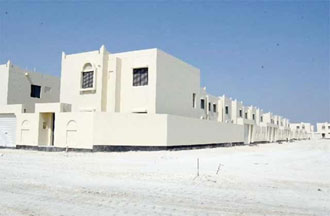
|
 |
 |
|
|
|
|
|
|
|
|
|
|
|
|
|
|
|
|
|
|
|
|
|
|
Economic, Social and Cultural RightsBahrain and the Right to HousingDespite the issuance of the Covenants on Civil and Political Rights (CPR) and on Economic, Social and Cultural Rights (ESCR) at the same time (1966), the implementation of the latter has drawn less attention in the human rights system, due to several reasons including: ■ Predominance of CPR over ESCR. Human rights abuses such as torture and cruel and inhumane treatment; extrajudicial killings; arbitrary arrest and detention; unfair trials, etc. still dominate the human rights arena while countries of the world are still grappling in the search for the appropriate political system. During the Cold War, Western countries focused on CPR and not on ESCR in their struggle with the socialist camp. ■ Developing countries have been providing excuses after excuses about the difficulty of the realization of ESCR claiming the high cost required to fulfill such rights, while Western countries insist on not providing technical and financial support to developing countries in absence of progress in the political and democratization process. ■ Corruption in many countries has led to the non-fulfillment of economic, social and cultural rights. ■ Weak culture of human rights in general, and on Economic, Social and Cultural Rights in particular. ■ Lack of qualified staff in the international organizations in the field of ESCR. The right to adequate housing is one of the important ESCR given the rapid rise in population growth across the globe. It is provided for in Article 25 (1) of the Universal Declaration of Human Rights (UDHR), Article 11 of the International Covenant on Economic, Social and Cultural Rights (ICESCR). Both instruments referred to it as part of the ‘right to an adequate standard of living’. Bahrain acceded to the ICESCR in 2008, which made it a legal, ethical and political responsibility for Bahrain to fulfill its provisions, notably the right to housing for its citizens. This right has bearing on a number of important issues related to its enjoyment including protection against forced evictions, tenant protection, discrimination in the housing allocation or access to basic housing-related services. In this case national courts adjudicate cases related to these issues in order to ensure enjoyment of the right. In line with this international obligation, the National Action Charter of Bahrain provides for social security for Bahrainis under Chapter 1 (6): (The State ensures necessary social security for citizens in cases of aging, invalidity, orphanage, widowing and unemployment. The state also secures social insurance services for citizens in such cases). Article 5 (c) of the Constitution of the Kingdom of Bahrain echoed the above statement of the National Action Charter as follows: The State guarantees the requisite social security for its citizens in old age, sickness, disability, orphanhood, widowhood or unemployment, and also provides them with social insurance and healthcare services. It strives to safeguard them against ignorance, fear and poverty.
However, Article 9 (f) of the Constitution explicitly provides for the State’s obligation to provide housing, particularly to those with ‘limited income’. The Article reads: ‘the State shall endeavour to provide housing for citizens with limited income’. To translate all these articles into action, Bahrain has made great efforts to provide suitable houses or allowances to cover house rent for the growing number of population. For example, between 2005 and 2009 Bahrain allocated 17,500 housing units to Bahrainis and provided housing benefits to 24,000 families, according to the Housing Minister Sheikh Ibrahim bin Khalifa Al Khalifa. The Minister said that the Ministry of Housing is proceeding with the implementation of strategic plans to provide adequate housing for citizens and promote sustainable development in Bahrain to implement the directives of the King. (Al-Ayam, 14/10/2009). These plans, which were approved by the Economic Development Board and adopted by the Council of Ministers, come within the framework of the economic vision of the Kingdom of Bahrain for 2030. Having this in mind, Bahrain is accelerating its efforts to build more than 10 thousand housing units across the country by 2011, of which 1500 units will be allocated for the people of Riffa in the southern province. (Albilad, 19/10/09). Despite all these efforts, the problem seems to be far from being resolved. Still more than 35,000 housing applications are yet to be considered. There is also the problem of long waiting lists. On 13 September 2009, the Council of Ministers adopted the Housing Future Plan for 2009 – 2014, which aims at reducing waiting times and that all applications should be considered by 2011 to clear all housing applications on waiting lists since 2002. Generally, the Ministry is also looking at reducing the waiting time for housing to only 5 years. On the other hand, Government, private sectors and people should join forces to deal with this chronic problem. In this regard, the Government should increase allocation of fund to the Ministry of Housing, and to raise the ceiling of housing loans provided by the Government, and this is what Parliament is trying to regulate. Furthermore, all lands that have recently been allocated for commercial investments, and which were mainly dedicated for housing, should be returned to the housing projects once again. Also there is need to respond promptly to urgent housing needs by providing temporarily accommodation. Above all it is important to review the age necessary for considering applications by allowing people above 50 years to apply for housing. By excluding people who exceed 50 years, we discriminate against the elderly. Finally, the housing crisis in Bahrain has created negative reaction vis-à-vis Government’s response, and has caused political and sectarian tensions as happened in some cases recently amid allegations that the Government did not comply with the regulations in the distribution of houses to citizens according to the positions in the queue. |
